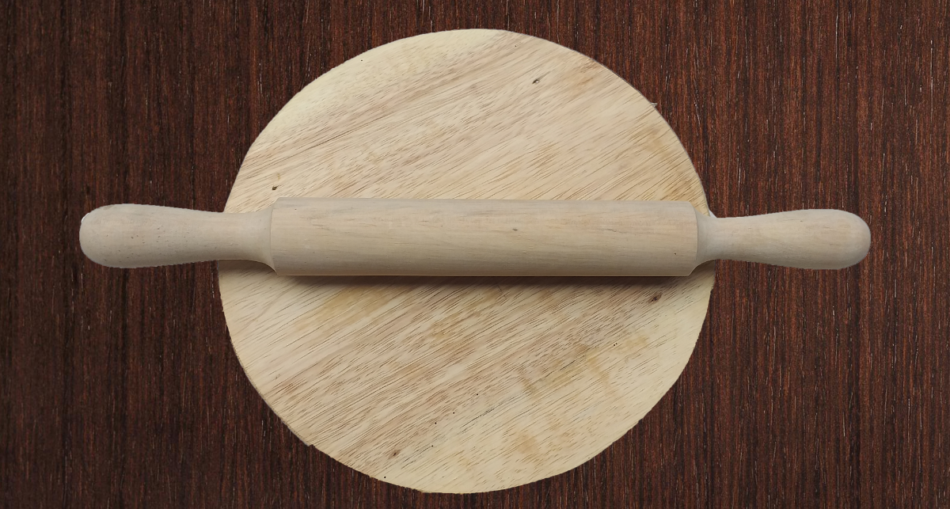On the 5th May 1838, East Indian Indentured Immigrants landed on the shores of Guyana, bringing along very little with the exception of their dynamic culture and way of life. The immigrants retained most of their cooking methods, which required certain equipment like the belna and chowki, used in roti making. Their diet was adapted to the availability of food but roti remained a major part of the diet of East Indians and as such, the belna remained a key utensil over the years. However, the Belna and Chowki are only two of the traditional kitchen utensils used by Guyanese, primarily those of Indian descent. Some other kitchen utensils are the ghotni, used to mash or “gote” dhal, the phoki, used to stoke firesides and the mortar and pestle for preparing our local green seasoning. Of these, the Belna is perhaps the most widely used apparatus, in Guyana and the Caribbean in countries like Trinidad and Tobago where there are large amounts of people of Indian descent.
The Belna, along with its counterpart the Chowki, was introduced to Guyana by the East Indian Indentured Immigrants. There are several variations of the word Belna including belan, and bilna, which is used in Trinidad. The Belna and Choki pair is often referred to as chaka belan, and chakla baran in Asia while the Chowki is called the pasteboard or chakla. Around the world, the belna or rolling pin is known as palotes.

Belna and Chowki – Photo by Sarika Prasad
Origin of the Belna and Chowki
It is believed that the Belna originated around the Harrapan era which existed in 3300 BC lasting until 1600BC. It was part of the Indus Valley civilization where they cultivated wheat and barley. The early form of the Chakla Belan (Belna and Chowki) is believed to have been made here, in what is now known as Punjab. The use of the utensil spread through large trade networks to the rest of the people in India called the Aryans. While the Belna and Chowki are believed to have originated in India, the rolling pin was invented by the Etruscans, people who migrated from Asia Minor (Asian Turkey) are believed to have lived in Italy. From here, the use of the rolling pin spread to the rest of Europe.
Description of The Belna and Chowki
The Belna basically is a variation of the English Rolling Pin. Simply put the Belna is a cylindrical utensil typically made of wood. It is about ten to fifteen (10-15) inches in length and about two and a half to three (2.5-3) inches in diameter. It has two ends that are shaped like tapered batons before forming round ends. The Chowki, typically paired with the Belna is a round, wooden apparatus used in India bread making or roti making.
Use of The Belna and Chowki
- The Belna is used in most households in Guyana to roll or flatten the dough or loya (roti dough) for rotis and puris.
- Belnas are arguable the same as rolling pins, which is used in the making of pastries like pine-tarts, butterflaps and patties.
- The rolling pin is also used to roll out the dough for pizza and piecrusts.
- Belnas are multipurpose tools which can crack open nuts and some Guyanese even use it to break ice into smaller pieces.
- The preparing of a round roti is a matter of pride among some in Guyana. Using a Chowki ensures that every roti is perfectly round.
Interesting Tip
- Flattening or rolling out the dough is what Guyanese refer to as balaying.
About Belna and Chowki
To date, many Guyanese use the Belna to roll out dough before preparing sada roti, paratha roti and puris. The Belna and Chowki pair is sold across Guyana, in markets and in the towns. These utensils have very long lifespans and as such are passed down from generation to generation. While most people use the Belna, the Chowki is not always used and is less common in Guyana. If you’re thinking about mastering the art of making the perfect, round roti, invest in a Chowki and Belna as soon as possible.
Article References
- http://wiwords.com/word/belna
- https://www.propaeats.com/bilna-and-chowki-traditional-indian-kitchen-tools/
- https://www.guyanatimesinternational.com/indian-kitchen-utensils/
- http://designhistoryatnid.blogspot.com/2008/08/chakla-baran-notes-and-references-so.html
- https://www.cooksinfo.com/rolling-pins
- http://www.madehow.com/Volume-7/Rolling-Pin.html#:~:text=The%20first%20civilization%20known%20to,may%20have%20originated%20in%20Italy.&text=They%20also%20used%20rolling%20pins,number%20of%20grains%20they%20grew.








1 Comment